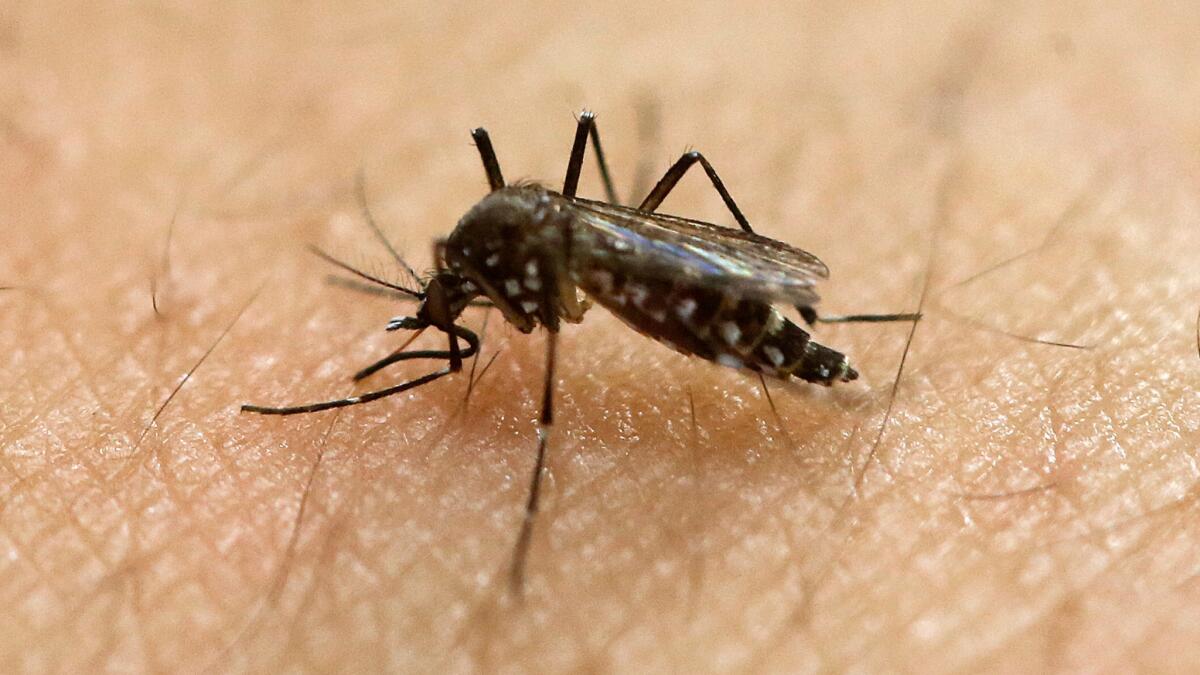Zika concerns halt blood donations in Miami area

- Share via
Reporting from Miami — Federal authorities have told blood centers in two Florida counties to suspend collections amid investigations into four mysterious cases of Zika infection that may be the first spread by mosquitoes on the U.S. mainland.
Blood centers in the Miami and Fort Lauderdale areas were asked to immediately stop collecting blood until they can screen each unit of blood for the Zika virus with authorized tests, according to a statement on the U.S. Food and Drug Administration website.
Florida health officials have said the infections in Miami-Dade and Broward counties may not be linked to travel outside the U.S., but they have not confirmed how the virus spread.
Investigators are going door-to-door in the affected areas to talk with residents and collect samples. No mosquitoes collected from those areas so far have tested positive for Zika, said Jennifer Meale, spokeswoman for the state’s Department of Agriculture and Consumer Services.
The FDA recommends that neighboring counties also implement the same precautions “to help maintain the safety of the blood supply as soon as possible.”
Visitors to South Florida in the last month are being urged to defer donations as well.
The FDA previously advised U.S. blood banks to refuse donations from people who recently travelled to areas outside the country that have Zika outbreaks.
Florida’s main supplier of blood said it was working as quickly as possible to comply with the FDA’s “unanticipated” request and would start testing all its collections for Zika on Friday.
OneBlood suspended collections earlier this week in the areas of Miami-Dade and Broward counties that are being investigated, according to a statement released Thursday.
The FDA is working with companies making the blood screening tests available to expand their operations, and blood centers nationwide can do this testing even without the transmission of Zika by local mosquitoes, Peter Marks, director of the FDA’s Center for Biologics Evaluation and Research, said in a statement Thursday.
Blood banks in Texas and Hawaii have begun or soon will start testing blood donations for the Zika virus. Puerto Rico suspended blood donations and imported blood products for the month of March until U.S. health officials approved the use of an experimental test to screen blood donations for the virus.
Messages left Thursday for officials at the Florida Department of Health were not immediately returned. Miami-Dade County’s Department of Solid Waste Management released a statement saying mosquito control inspectors are spraying pesticides and eliminating mosquito breeding sites in response to both to residents’ complaints and health department requests.
Residents are reminded that they are the first line of defense against the spread of mosquito-borne viruses. Residents can help by draining any standing water outside their homes, covering areas where standing water is likely to accumulate, and using mosquito repellent outdoors.
See more of our top stories on Facebook »
Zika is mainly spread by mosquitoes, as well as sex. So far, the 1,400 infections reported in the U.S. — including 383 in Florida — have been linked to travel to countries in Latin America or the Caribbean with Zika outbreaks.
There have been no reports of the virus in the country’s blood supply, though FDA officials have said Zika transmission through blood is possible.
The virus causes only a mild illness in most people, but scientists have confirmed that infection during pregnancy can lead to severe brain-related birth defects.
The tropical mosquito that spreads Zika and other viruses is found in the southern U.S. While health officials have predicted that mosquitoes in the continental U.S. would begin spreading Zika this summer, they also have said they expect only isolated clusters of infections and not widespread outbreaks.
ALSO
Zika’s unrelenting march across the Americas: ‘An emergency that we need to address’
When it comes to raising a child disabled by Zika, Brazilian women often do it alone
A mysterious case of Zika raises new fears of person-to-person transmission
More to Read
Sign up for Essential California
The most important California stories and recommendations in your inbox every morning.
You may occasionally receive promotional content from the Los Angeles Times.










